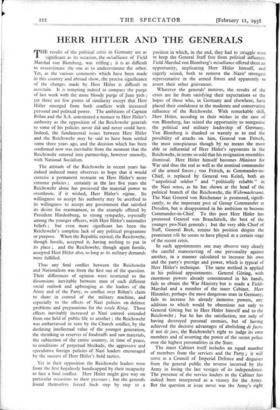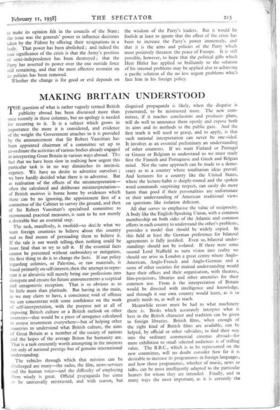HERR HITLER AND THE GENERALS
THE results of the political crisis in Germany are as significant as its occasion, the misalliance of Field Marshal von Blomberg, was trifling ; it is as difficult to overestimate the one as to underestimate the other. Yet, as the various comments which have been made in this country and abroad show, the precise significance of the changes made by Herr Hitler is difficult to ascertain. It is tempting indeed to compare the purge of last week with the more bloody purge of June 3oth ; yet there are few points of similarity except that Herr Hitler emerged from both conflicts with increased personal and political power. The ambitions of Captain Rohm and the S.A. constituted a menace to Herr Hitler's authority as the opposition of the Reichswehr generals to some of his policies never did and never could have. Indeed, the fundamental issues between Herr Hitler and the Reichswehr may be said to have been settled some three years ago, and the decision which has been confirmed now was inevitable from the moment that the Reichswehr entered into partnership, however uneasily, with National Socialism.
The attitude of the Reichswehr in recent years has indeed induced many observers to hope that it would exercise a permanent restraint on Herr Hitler's more extreme policies ; certainly in the last five years the Reichswelhr alone has possessed the material power to overthrow, if it wished, Herr Hitler's regime. Its willingness to accept his authority may be ascribed to its willingness to accept any government that satisfied its desire for rearmament, to the example offered by President Hindenburg, to strong sympathy, especially among the younger officers, with Herr Hitler's nationalist beliefs ; but even more significant has been the Reichswehr's complete lack of any political programme or purpose. When the Republic existed, the Reichswehr, though hostile, accepted it, having nothing to put in its place ; and the Reichswehr, though again hostile, accepted Herr Hitler also, so long as its military demands were fulfilled.
Thus any final conflict between the Reichswehr and Nationalism was from the first out of the question. Their differences of opinion were restricted to the dissensions inevitable between men of such different social outlook and upbringing as the leaders of the Army and of the Party, to conflict over Rohm's claim to share in control of the military machine, and especially to the effects of Nazi policies on defence problems and preparations for the totale Krieg. Those effects inevitably increased as Nazi control extended from one field of public life to another ; the Reichswelr was embarrassed in turn by the Church conflict, by the declining intellectual value of the younger generation, the shrinking in reserves of foodstuffs and raw materials, the subjection of the entire country, in time of peace, to conditions of perpetual blockade, the aggressive and speculative foreign policies of Nazi leaders encouraged by the success of Herr Hitler's bold tactics.
Yet in their opposition the Reichswehr leaders were from the first hopelessly handicapped by their incapacity to face a final conflict. Herr Hitler might give way on particular occasions to their pressure ; but the generals found themselves forced back step by step to a position in which, in the end, they had to struggle even to keep the General Staff free from political influence. Field Marshal von Blomberg's misalliance offered them an opportunity, implicating Herr Hitler himself; and eagerly seized, both to remove the Nazis' strongest representative in the armed forces and apparently to assert their other grievances.
Whatever the generals' motives, the results of the crisis are far from satisfying their expectations or the hopes of those who, in Germany and elsewhere, have placed their confidence in the moderate and conservative influence of the Reichswehr. With remarkable skill, Herr Hitler, acceding to their wishes in the case of von Blomberg, has seized the opportunity to reorganise the political and military leadership of Germany. Von Blomberg is thanked so warmly as to end the possibility of attacks on him, General von Fritsch, the most conspicuous though by no means the most able or influential of Herr Hitler's opponents in the Reichswehr, in terms so cold that his resignation resembles dismissal. Herr Hitler himself becomes Minister for War and thus the real as well as the nominal commander of the armed forces ; von Fritsch, as Commander-in- Chief, is replaced by General von Keitel, both an " unpolitical soldier " and " politically reliable " in the Nazi sense, as he has shown at the head of the political branch of the Reichswehr, the Wehrmachtsamt. The Nazi General von Reichenaur is promoted, signifi- cantly, to the important post of Group Commander at Dresden, but is disappointed in his ambition to become Commander-in-Chief. To this post Herr Hitler has promoted General von Brauchitsch, the best of the younger pro-Nazi generals ; but the very able Chief of Staff, General Beck, retains his position despite the prominent role he seems to have played at a certain stage of the recent crisis.
In such appointments one may observe very clearly the careful manoeuvring of one personality against another, in a manner calculated to increase his own and the party's prestige and power, which is typical of Herr Hitler's technique. The same method is applied in his political appointments. General Goring, with enormous powers already concentrated in his hands, fails to obtain the War Ministry but is made a Field- Marshal and a member of the inner Cabinet. Herr Himmler, perhaps the most dangerous man in Germany, fails to increase his already immense powers, any addition to which would be obnoxious not only to General Goring but to Herr Hitler himself and to the Reichswehr ; but he has the satisfaction, not only of having destroyed personal enemies, but of having achieved the decisive advantages of abolishing de facto, if not de jure, the Reichswehr's right to judge its own members and of asserting the power of the secret police over the highest personalities in the State.
The inner Cabinet itself includes an equal number of members from the services and the Party ; it will serve as a Council of Imperial Defence and disguises from the general public the reverse incurred by the Army in losing the last vestiges of its independence. The presence of the service leaders in the Cabinet has indeed been interpreted as a victory for the Army. But the question at issue never was the Army's right to make its opinion felt in the councils of the State; the issue was the generals' power to influence decisions taken by the Fiihrer by offering their resignations in a body. That power has been abolished ; and indeed the true significance of the crisis is that the Army's position of semi-independence has been destroyed ; that the Party has asserted its power over the one outside force still remaining, and that the most effective restraint on its policies has been removed.
Whether the change is for good or evil depends on the wisdom of the Party's leaders. But it would be foolish at least to ignore that the effect of the crisis has been to increase the Party's power immensely, and that it is the aims and policies of the Party which most positively threaten the peace of Furope. It is still possible, however, to hope that the political gifts which Herr Hitler has applied so brilliantly to the solution of his internal problems may be applied also to achieving a pacific solution of the no less urgent problems which face him in his foreign policy.



















































 Previous page
Previous page